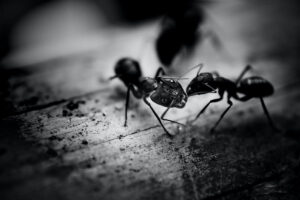How To Get Rid Of Ants In Your New Jersey Property
How to get rid of ants and the reason why they are invading your home
Every once in a while everyone gets a mini invasion of ants in their home, but why does this happen? And how do you get rid of them? To answer those and more questions regarding the topic, this article will come in handy.
Below you can read about the reason why you have ants in your home, how to identify which type of ant you have, and 3 ways to get rid of them.
What Causes Ants To Invade Your Home & How To Prevent It
 Ants are a prevalent nuisance in homes for the simple reason that indoor rooms, particularly kitchens and pantries, provide them with food and shelter. Ants are attracted to crumbs, spilled foods, and pet foods, and the dark places in walls and beneath floors provide many opportunities for them to build nests. It’s mostly a matter of denying ants food and nesting locations to eliminate and prevent them.
Ants are a prevalent nuisance in homes for the simple reason that indoor rooms, particularly kitchens and pantries, provide them with food and shelter. Ants are attracted to crumbs, spilled foods, and pet foods, and the dark places in walls and beneath floors provide many opportunities for them to build nests. It’s mostly a matter of denying ants food and nesting locations to eliminate and prevent them.
Ants are little insects that can get inside homes and structures through microscopic cracks and openings. Seal around windows and doors, as well as all cable, pipe, and wire access points, to reduce this. Inspect your foundations on a regular basis for minor gaps that ants can use to gain access to your property.
Keeping things clean of crumbs and storing goods in sealed containers can deprive ants of the foods they seek and eliminate the primary reason they come indoors.
Different Types Of Ants
There are various sorts of common ants found in the home, and it’s critical to know which one you’re dealing with so you can take the appropriate precautions.
Pavement ants, odorous house ants, and pharaoh ants are the most common kinds found within the home (also known as sugar ants). These species can be found in nearly every state in the United States, and they thrive on sugars, greases, and other compounds often found in home kitchens. They come in a variety of colors, including dark brown, black, and pale yellowish-brown, and while they are unpleasant and perhaps unclean, they do not constitute a major threat.
Carpenter ants (Camponotus spp., up to ⅝ inches) are more dangerous than most species because they feed primarily on decaying wood, and the tunnels they create in a home’s wood framing to reach the decayed wood can cause significant structural damage. Residual wood dust and debris surrounding the foundation and sill plate of the home, material removed by the ants as they burrow tunnels in the structure, is a clear sign.
Termites are even more dangerous than ants (Isoptera spp.). Termites and carpenter ants might appear similar in color, size, and the type of damage they do at first glance. A termite’s body, on the other hand, does not have the small “waist” and obviously segmented body found in carpenter ants.
If one of these pests is discovered, you should get advice from an exterminator, since they can cause significant structural damage if not treated. Terminator Termite & Pest Management Inc. is your trustworthy terminator company in New Jersey that can properly take care of all of your insect problems within minutes. Contact us for further details and access affordable prices for our top-class services.
How To Get Rid Of Ants: 3 Ways
 Identifying the pathways followed by worker ants to travel to and from the nest is an important first step in eliminating ants from the house. Any visible ants crawling around your home are looking for food, and once they find it, the worker ant returns it to the colony. The ant, therefore, creates a chemical trail for its fellow worker ants to follow in order to obtain additional food.
Identifying the pathways followed by worker ants to travel to and from the nest is an important first step in eliminating ants from the house. Any visible ants crawling around your home are looking for food, and once they find it, the worker ant returns it to the colony. The ant, therefore, creates a chemical trail for its fellow worker ants to follow in order to obtain additional food.
This behavior is what allows you to fight ants since you can now trick the worker ants into carrying poisoned food (ant bait) back to the colony.
1. For Indoors Solutions Use Ant Baits
Ant baits are made up of appetizing components, mainly sweet, sugary carbohydrates, blended with compounds harmful to ants but not to animals or humans. Avoid the temptation to just spray visible ants traveling along trails inside your home with insecticides. Pesticide sprays may kill a few visible ants, but more will immediately replace them, and the infestation will never be completely eradicated.
Instead, place an ant killer for these worker ants to carry back to the secret nest and utilize them as a ticket inside the colony.
2. For Outdoors Fix Use Pesticide
If you trace ant trails and find an outdoor nest for the colony, a high dosage of liquid insecticide that can sink down to reach the queen may be appropriate. It may be effective to spray the nest with an approved insecticide (following all label guidelines).
However, double-check that this is the colony that’s causing your interior infestation. Many varieties of ants are beneficial garden insects that should not be killed.
3. Keep Your House Clean
For the prevention and control of any pest, sanitation is essential. Ants, like all living things, require water, food, and shelter to survive. Ants leave their colony’s safety to seek food and water. Make things difficult for them. Seal foods, sweep the floors and clean all surfaces.
Keep everything clean when targeting the nest, as the sweet ant bait will be the only item available to the ants. But don’t clean up the ant trails until the infestation is gone, because they’ll help the ants find your bait and transport it back to the colony. Clean up the trail surfaces and maintain them clean once the ants are gone.
Getting Rid Of Ants Wrap Up
Getting rid of ants can become a tedious and expensive process if you’re doing it by yourself, which is why calling a professional terminator company is recommended.
Contact Terminator Termite & Pest Management Inc. for a personalized quote for your specific ant problems to finally wander freely in your home without encountering little insects around your house.

Terminator Termite and Pest Management, Inc.
Phone: 732-544-9144
Website: aterminator.com





